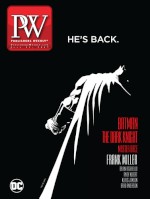In Lightning Men (37 Ink, Sept.), the second in a series, Mullen uses a hard-boiled crime novel to explore post-WWII racism in the South.
How did you learn about Atlanta’s first African-American police officers?
I read in a history of the city about the circumstances around the hiring of Atlanta’s first eight African-American police officers, and the insulting Jim Crow restrictions they operated under: they could only patrol “colored neighborhoods,” they only worked the night shift, they could not drive squad cars, and they could not set foot in the police headquarters—instead they had to operate their own makeshift precinct in a YMCA basement. Last, but not least, they could not arrest white people. And if, God forbid, they ever saw a white person committing a crime, they were supposed to call in white officers to help.
How did that lead to this series?
I found myself imagining the plot of the first book, in which two of the black rookies do in fact come upon a white criminal, and begin to suspect a white cop helped him murder a young black woman. I found myself thinking of the different stories I could tell if I followed some of these characters over the next decades and traced how they, the city, the South, and the country changed as a result of the civil rights movement.
Why do you consider this series totalitarian noir?
I’m a big fan of murder mysteries that up the moral ante by placing their hero inside a corrupt, totalitarian regime—like Philip Kerr’s Bernie Gunther series in Nazi Germany. It occurred to me that I could write my own “totalitarian noir” right in my own town, because the South was every bit a totalitarian nation if you were black.
What governed the timing of the creation of a black force in Atlanta?
The mayor saw that the city’s black community was growing and becoming more politically organized, so he promised that he’d hire black cops just as soon as they had 10,000 black votes. But blacks were barred from voting in the Democratic primary, the only vote that really mattered in the one-party South. That changed in 1944 when the Supreme Court ruled, in Smith v. Allwright, that all-white primaries were unconstitutional. Thurgood Marshall, who argued the case, would always insist it was the most important win of his career because it involved the vote, which is the key to democracy. That’s worth bearing in mind at a time when voter suppression efforts are gaining steam. I couldn’t help giving Marshall a brief cameo in Lightning Men, partly because the characters literally owe their jobs to him.



 Volume 264
Issue 31
07/31/2017
Volume 264
Issue 31
07/31/2017





